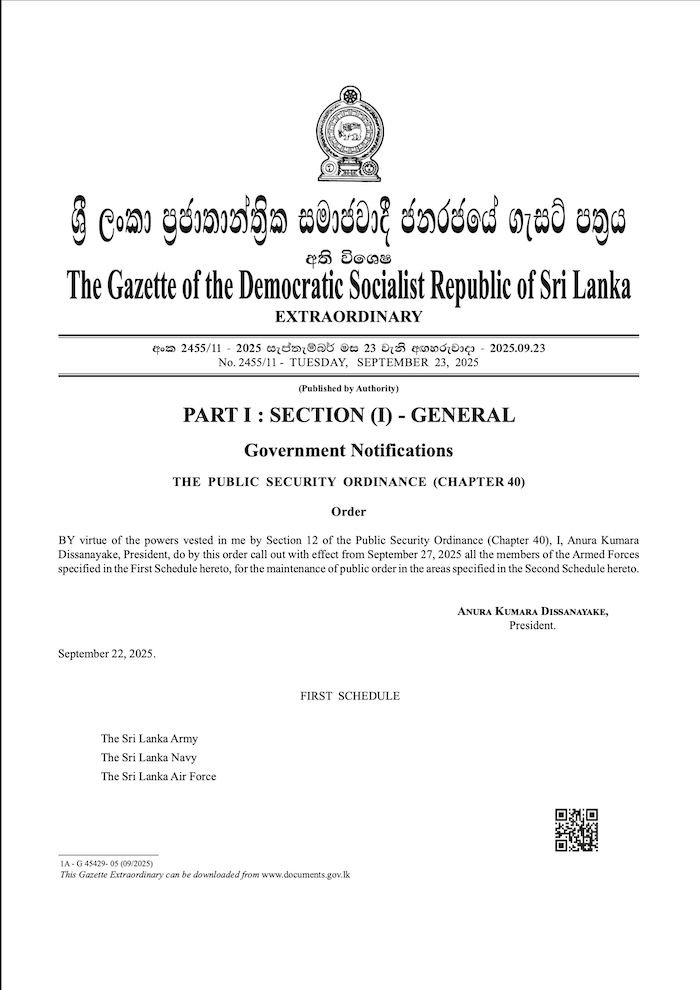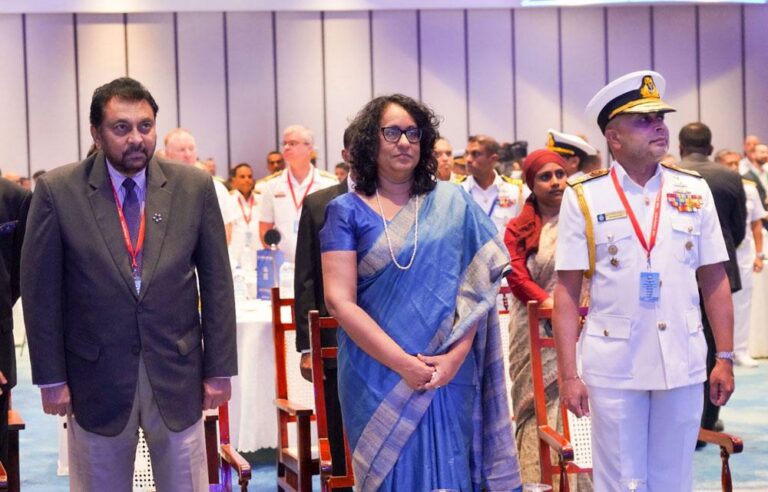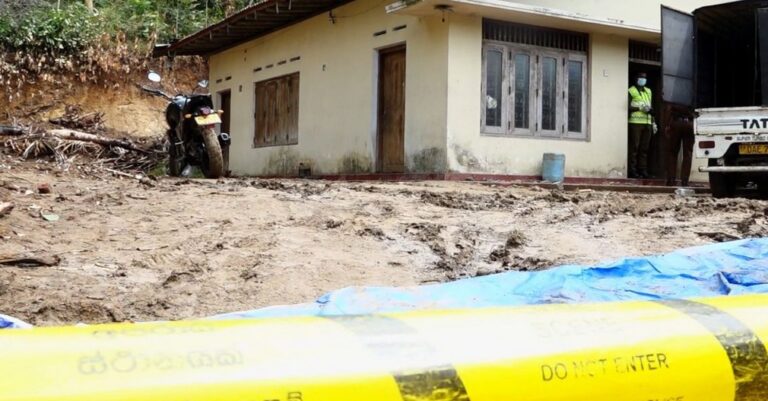By: Staff Writer
September 25, Colombo (LNW): Sri Lanka’s fragile economy has increasingly become dependent on foreign assistance, with grants and preferential trade schemes forming critical lifelines. The latest example came yesterday, when the Finance Ministry announced a €8 million ($9.4 million) grant from the European Union (EU) aimed at supporting biodiversity conservation and solid waste management.
Treasury Secretary Dr. Harshana Suriyapperuma, who signed the agreement with EU Ambassador Carmen Moreno, hailed the project as consistent with Sri Lanka’s sustainable development agenda. The project will focus on restoring degraded ecosystems, implementing conservation strategies, and modernising waste management areas long plagued by underfunding and policy neglect.
Ambassador Moreno noted that biodiversity is among Sri Lanka’s most valuable assets, adding that EU expertise, technology, and private-sector investment would back these initiatives. “Protection of biodiversity contributes to global health and the fight against climate change,” she said.
But experts caution that such grants, while welcome, are modest compared to Sri Lanka’s larger financial challenges. For instance, the United States provided over $42 million in grants to Sri Lanka in 2024, with allocations spanning renewable energy, agriculture, democratic governance, and humanitarian relief. These flows of aid, however, often come linked to broader policy agendas, raising questions about how much sovereignty Sri Lanka retains in shaping its development path.
Beyond grants, the EU wields another tool with far greater economic impact—the Generalised Scheme of Preferences Plus (GSP+), a preferential trade arrangement that allows duty-free access to more than 6,000 Sri Lankan products in European markets.
According to the Central Bank, Sri Lanka exported $3.6 billion worth of goods to the EU in 2024, making the bloc its second-largest export destination. Of this, the apparel sector accounted for over $2.5 billion, representing nearly 40% of total national export earnings.
The stakes are therefore high: if Sri Lanka loses GSP+ due to non-compliance with EU requirements—covering 27 international conventions on human rights, labour rights, environmental protection, and good governance exports could take a severe hit. Industry analysts warn that without duty-free access, Sri Lankan apparel could lose competitiveness against rivals like Bangladesh and Vietnam, potentially leading to tens of thousands of job losses, particularly among women in garment factories.
This review is particularly sensitive given the EU’s ongoing monitoring of governance and human rights concerns in Sri Lanka. A potential suspension of GSP+ would dwarf the benefits of the $9.4 million biodiversity grant, wiping out billions in export revenues.
The contrasting scale between modest grants and massive trade leverage underlines a deeper truth: aid and concessions rarely come without conditions. While the EU’s grant addresses vital environmental concerns, Sri Lanka’s long-term economic stability depends on its ability to safeguard GSP+ status while balancing domestic policy priorities with external expectations.
As the country struggles to rebuild from its debt and currency crises, its reliance on such international partnerships exposes both opportunity and vulnerability. The EU grant may help green the economy, but the looming GSP+ review could decide the fate of hundreds of thousands of livelihoods.
EU Grant Highlights Sri Lanka’s Aid Dependence and Trade Risks
President Deploys Armed Forces Nationwide to Uphold Public Security
September 25, Colombo (LNW): President Anura Kumara Dissanayake has issued an Extraordinary Gazette calling upon the armed forces to be mobilised across the country in support of maintaining public order and security, Parliament was informed today (25).
Speaker Dr Jagath Wickramaratne made the announcement during parliamentary proceedings, noting that the directive will take effect from September 27, 2025.
The order has been made under the authority granted to the President by Section 12 of the Public Security Ordinance, a legal framework that allows for military involvement in civilian affairs under specific circumstances deemed necessary for national stability.

CPSTL Declares End to Politically Driven Hiring as Merit-Based HR Policy Takes Effect
September 25, Colombo (LNW): In a decisive move to overhaul decades of politically influenced employment practices, the Ceylon Petroleum Storage Terminals Ltd. (CPSTL) has announced a sweeping reform to its human resource management policy, pledging to eliminate all forms of favouritism and introduce a strictly merit-based system for future appointments, promotions, and internal transfers.
Addressing the media on the first anniversary of the current administration, CPSTL Chairman D.J.A.S. De S. Rajakaruna openly acknowledged that the organisation had lacked a structured and consistent HR framework for more than three decades. He described this long-standing vacuum as a major obstacle to institutional integrity and efficiency.
“This organisation has operated without a clear and consistent policy on managing its human resources for 34 years. That ends now,” Rajakaruna declared. “We are establishing a professional and transparent approach to recruitment and advancement. No more backdoor entries, political letters, or phone calls from high offices.”
The newly introduced HR model—developed following a detailed work-study conducted by a state agency—outlines a clear structure of designations, responsibilities, and qualification standards. It is designed to professionalise the workforce and ensure accountability across all departments.
As part of the internal restructuring process, CPSTL has significantly reduced its employee base. The Chairman confirmed that 1,600 positions have been phased out, citing a widespread lack of essential qualifications among the redundant staff.
Simultaneously, the Ceylon Petroleum Corporation (CEYPETCO), its affiliated entity, has reduced its workforce by 1,200. Several non-essential units within CPSTL have also been dissolved.
Rajakaruna strongly advised the public against lobbying politicians or senior officials for employment or placement opportunities within the organisation. “From now on, every candidate will be evaluated based on their credentials and experience. We want to make it absolutely clear that the era of influence-based hiring is over.”
With a leaner, more qualified workforce and a structured HR blueprint in place, CPSTL aims to lead by example—prioritising professionalism, eliminating inefficiencies, and restoring confidence in the administration of state-owned enterprises.
Court Extends Remand of Backhoe Saman’s Wife Amid Ongoing Financial Crimes Probe
September 25, Colombo (LNW): A woman alleged to have close ties to a prominent underworld figure remains in judicial custody as authorities intensify investigations into suspected money laundering and drug-related activities connected to organised criminal networks.
The Colombo Magistrate’s Court has ordered that Shadhika Lakshani, the spouse of a reputed underworld suspect known by the alias ‘Backhoe Saman’, remain in remand custody until October 09.
The ruling was issued by Chief Magistrate Asanka S. Bodaragama following a hearing that included representations from both the Criminal Investigation Department (CID) and the defence.
Lakshani is currently being held under provisions of the Prevention of Money Laundering Act, with investigators probing her alleged involvement in handling or concealing illicit proceeds believed to originate from narcotics operations.
During the court proceedings, the Magistrate directed the CID to present a detailed evidentiary brief at the next hearing, specifically outlining the suspect’s purported links to a drug trafficking network reportedly active in the Middeniya area.
The investigation gained traction following the arrest of Lakshani and her child at Bandaranaike International Airport on August 29, upon their arrival in the country. Law enforcement authorities, acting on intelligence, detained the pair and commenced a wider probe into financial transactions and assets thought to be connected to criminal enterprises.
Although the child was subsequently released to the care of relatives, Lakshani has remained in custody as part of what officials describe as a broader crackdown on individuals enabling or facilitating organised crime through financial channels.
Prime Minister Stresses Global Unity in Combatting Indian Ocean Threats at Galle Maritime Summit
September 25, Colombo (LNW): Prime Minister Dr Harini Amarasuriya has emphasised the critical importance of international cooperation in addressing escalating security threats in the Indian Ocean, particularly the rise in maritime drug trafficking.
Her remarks were delivered during the opening of the 12th International Maritime Conference – Galle Dialogue 2025 – held at the Navy’s Wave and Lake Banquet Hall in Welisara.
Addressing a gathering of defence officials, diplomats, and maritime experts from across the globe, the Prime Minister underscored that the Indian Ocean is not only a key artery for international trade and energy flows, but also a crucial lifeline for the economic and social well-being of millions across the region. She noted, however, that with its strategic significance comes a host of mounting challenges.
“The Indian Ocean continues to witness increasing pressures—from shifting geopolitical dynamics and environmental degradation to illicit trafficking and unregulated migration. These are issues that no single country can confront in isolation,” she said.
Dr Amarasuriya pointed to Sri Lanka’s unique position at the heart of the Indian Ocean maritime corridor as both a responsibility and an opportunity. She stressed the need for Sri Lanka to play a proactive role in preserving the region’s peace, stability, and ecological balance.
She expressed particular concern over the proliferation of transnational organised crime at sea, especially the movement of narcotics, which she described as a growing menace to regional security and social stability.
The Prime Minister reaffirmed her government’s commitment to combating maritime drug smuggling, highlighting recent successes by the Sri Lanka Navy and Coast Guard in intercepting illicit shipments through coordinated patrols and targeted intelligence operations.
Reflecting the seriousness of the government’s intent, she announced that Rs. 92.5 billion has been allocated to the Navy under the 2025 Defence Budget — a 12 per cent increase from the previous year. The funding boost, she explained, will enhance surveillance capabilities, expand patrol coverage, and improve maritime domain awareness.
However, she was clear that national efforts alone will not suffice. “Sri Lanka cannot – and should not – attempt to shoulder these burdens on its own. Maritime threats are borderless, and so must be our responses,” she said, calling on regional and international partners to deepen collaboration.
Dr Amarasuriya advocated for robust coordination between naval forces, maritime industries, regulatory bodies, and civil society. She emphasised that upholding the rule of international maritime law and fostering trust between nations were essential to ensuring open and secure sea lanes.
“We must move beyond competition and into cooperation if we are to transform the Indian Ocean into a region defined not by conflict, but by peace, opportunity, and shared prosperity,” she concluded.
The Galle Dialogue, hosted annually by the Sri Lanka Navy, has evolved into a key forum for global maritime discourse, with the 2025 edition attracting record participation amidst growing concerns over maritime governance in an increasingly contested oceanic space.
Tangalle Drug Raid: Three Suspects Remanded
September 25, Colombo (LNW): Three individuals have been remanded in custody until September 29 as part of an ongoing probe into a suspected drug trafficking operation in the coastal town of Tangalle, where three men were found dead under mysterious circumstances and an enormous quantity of illicit drugs was seized.
The arrests stem from a major police operation launched after officers, acting on a confidential tip-off, discovered two lifeless bodies at a residence in the Seenimodara area on the morning of September 22.
A third man, found in critical condition at the same location, was rushed to Tangalle Hospital but later succumbed to his injuries.
Authorities quickly cordoned off the property and initiated a comprehensive investigation into the deaths and the surrounding events.
The three suspects currently in remand were brought before the Tangalle Magistrate late last night. Among those held is a relative of one of the deceased, along with two individuals linked to vehicles in which a vast quantity of illegal drugs was discovered.
One of the lorries reportedly belonged to Thusitha Wenukumara, who is also believed to have ties to the deceased, while another was registered to a different suspect now in custody.
According to police, six individuals in total have been detained in connection with the case. Investigators have traced over 700 kilograms of heroin and crystal methamphetamine—commonly known as “ice”—hidden in three separate lorries. The street value of the haul is estimated to be in the region of Rs. 10 billion, making it one of the largest drug busts in the region in recent memory.
Forensic examinations conducted by Judicial Medical Officer Dr Ruwan Nanayakkara at the Tangalle Base Hospital confirmed the presence of multiple narcotic substances in the systems of the deceased. The post-mortem results suggest that the men may have either overdosed or been deliberately administered high doses of synthetic drugs, though toxicological reports from the Government Analyst are still pending.
Initial inquiries indicate that the drug consignment was likely smuggled into the country via two boats that reportedly made landfall near Kudawella and Mawella on September 21. Authorities suspect that the narcotics were offloaded under cover of night and temporarily stored in the Tangalle property pending further distribution.
Fatal Road Crash Claims Three Lives in Early Morning Collision on Kurunegala–Anuradhapura Route
September 25, Colombo (LNW): A tragic road accident early this (25) morning has left three people dead and four others injured following a violent head-on collision between a lorry and a van near the Thalawa–Mirigama junction, along the Kurunegala–Anuradhapura main road.
According to initial reports from authorities, the crash occurred just before dawn when a lorry travelling from Anuradhapura towards Kurunegala collided directly with a van heading in the opposite direction. The force of the impact left both vehicles severely damaged, with wreckage strewn across the roadway.
Emergency services responded swiftly, and all seven individuals involved — including both drivers — were rushed to Thalawa and Anuradhapura hospitals for treatment. Despite the efforts of medical teams, three travelling in the van succumbed to their injuries shortly after being admitted.
The Thalawa Police Station have launched a full inquiry to determine the exact cause of the collision.
Update:
Latest developments indicate that another individual who was hospitalised after the accident has succumbed to his injuries.
Foreign Minister Engages in High-Level Diplomatic Talks on UNGA Sidelines to Bolster International Partnerships
September 25, Colombo (LNW): Foreign Minister Vijitha Herath engaged in a series of high-level diplomatic meetings with his counterparts from several nations on the margins of the 80th session of the United Nations General Assembly in New York, reaffirming Sri Lanka’s commitment to strengthening international partnerships and fostering deeper collaboration across diverse sectors.
During a cordial discussion with Maldivian Foreign Minister Abdulla Khaleel, both parties reviewed the enduring ties between their nations. The ministers reaffirmed the importance of continued engagement and explored new avenues for cooperation in areas such as maritime security, tourism, climate resilience, and regional development.
There was a shared understanding of the need to elevate the bilateral agenda to meet emerging regional challenges and shared aspirations.
In a separate meeting, Minister Herath held talks with Elina Valtonen, Minister of Foreign Affairs of Finland. The two sides expressed interest in enhancing cooperation in the spheres of education, green technology, and innovation.
They also exchanged views on the importance of transparent governance, human rights, and sustainable development — key pillars in Finland’s international outlook. Minister Herath expressed Sri Lanka’s readiness to collaborate with Nordic countries on climate-smart solutions and digital transformation.
Further adding to the day’s diplomatic engagements, Minister Herath conferred with Serap Güler, Minister of State at the Federal Foreign Office of Germany. Their conversation centred on deepening bilateral relations, with particular emphasis on trade, vocational training, and renewable energy.
The pair also exchanged views on pressing global matters, including geopolitical tensions, international peacebuilding efforts, and multilateral cooperation in addressing transnational threats.
The Minister also met with his Indian counterpart Dr. S. Jaishankar to reaffirm the strong friendship and close cooperation between Sri Lanka and India.
All meetings took place alongside the UN General Assembly in an atmosphere of mutual respect and cooperation. Minister Herath underscored Sri Lanka’s proactive role in international diplomacy and reaffirmed the country’s commitment to constructive engagement with global partners, particularly in the face of shared global challenges such as climate change, economic inequality, and digital transformation.
GovPay Digital Platform Sees Strong Uptake as Government Pushes for Nationwide Adoption
September 25, Colombo (LNW): Sri Lanka’s transition to a digital economy has taken a significant step forward with the growing adoption of GovPay, the government’s centralised digital payment platform.
Since its rollout, the system has processed transactions worth over Rs. 285 million, reflecting a marked shift towards digital financial services within the public sector.
Digital Economy Minister Eranga Weerarathne, speaking to journalists earlier this week, hailed the platform’s early success and underlined its growing reach across the country. According to the Minister, a total of 137 institutions — including a wide range of government departments and agencies — are now actively connected to GovPay.
Highlighting recent developments, the Minister noted that all state institutions across the Southern Province are now fully integrated with the system. Similar groundwork has been completed in the Northern Province, with ongoing efforts to extend the digital infrastructure into the Central Province.
“We’re laying the foundation for a more efficient, transparent and accessible public service,” the Minister remarked, adding that the uptake of GovPay is also helping to build public confidence in digital transactions.
In addition to government services, the GovPay platform has been introduced as a payment solution for traffic fines across the Western Province and along major expressways. The Ministry has confirmed that preparations are underway to implement the same facility in three more provinces, with plans to cover the entire country in a phased rollout.
Tender Chaos Leaves Number Plate Supply in Disarray
September 25, Colombo (LNW): A high-stakes government tender for the supply of vehicle number plates has sparked controversy after the two lowest bidders were excluded on technical grounds, clearing the way for the priciest offer to move forward—potentially costing the state over Rs. 500 million more than necessary.
This development unfolds amid mounting pressure on the roads, with more than 200,000 vehicles estimated to be operating without proper number plates, raising both logistical and security concerns, according to a report by Daily Mirror.
The tender process, riddled with shifting conditions and protracted delays, has now hit a standstill, according to the report.
Both rejected bidders—Access International and Metropolitan Technologies—have lodged formal appeals with the Procurement Appeal Board. Access, the lowest bidder, reportedly sourced its aluminium from the globally reputed Aditya Birla Group, which has supplied material for Sri Lankan plates since 2009.
The controversy hinges on a technical test conducted by the University of Moratuwa, which allegedly found that the sample plates failed to meet the required elasticity standards. However, questions have been raised over the consistency and fairness of the evaluation.
The Department of Motor Traffic defended the process, noting the same testing body was used in a previous tender. Still, critics argue that the rejection of the lowest bids undermines public trust in procurement procedures.
If awarded to the current highest bidder, South Asian Technologies, the state could be looking at a contract worth Rs. 2.59 billion—over half a billion rupees more than the lowest offer. With vehicle import restrictions now lifted and demand surging, the true financial impact could edge towards Rs. 1 billion.
All bidders have now been asked to extend their bid bonds, indicating further delays in resolving the impasse. Meanwhile, motorists remain caught in the middle of a stalled process with no clear end in sight.










